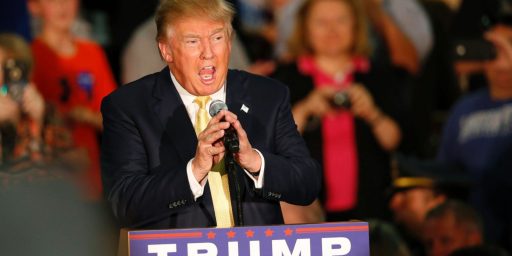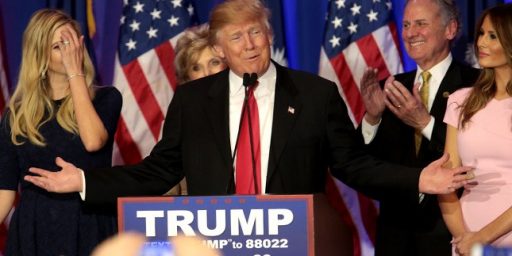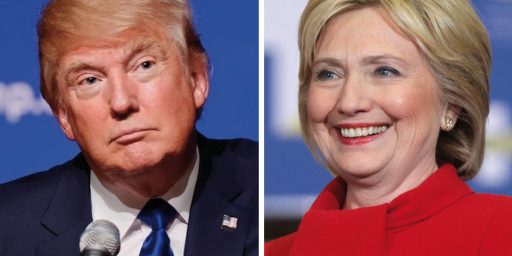An Important Reminder about Polling
We are still a ways from actual voting--this needs to be remembered.
 Repeat after me: the first votes in the 2016 nomination process will be cast Monday February 1, 2016 in Iowa. Yes, it is a mouthful, but the reminder is apt.
Repeat after me: the first votes in the 2016 nomination process will be cast Monday February 1, 2016 in Iowa. Yes, it is a mouthful, but the reminder is apt.
This means that polling today (you know, July) has to be taken with a shaker of salt. Yes, dear reader who is a political junkie, you are paying attention to the horse race, but most voters aren’t. Polling at this point in time, therefore, is of limited use.
Apparently, I am not the only person thinking this, because between the previous paragraph and this one I Googled “July 2007 GOP polling” to look for precise information on Rudy Giuliani’s bid for the nomination and found this post from the The Fix from yesterday: A reminder that July polls are very bad at predicting Republican nominees. The piece had exactly the data I was after:

Of the things this graph should help us all remember: that half a year from the start of voting name recognition means an awful lot (as I noted a few weeks ago), especially if a candidate has celebrity or near-celebrity status. I am sure Presidents Giuliani and Thompson would, in a private moment, agree with me.
In regards to the GOP field I would note again: Trump may be leading in national polls, but he is only getting ~20%. Now, while I am sure Ben Carson would love to have 20%, it must be remembered that a) the field is crowded and support is fragmented, and b) it still means that ~80% of those being polls do not have Trump as their first choice. There are two major questions for Trump: a) can he win at the state level and b) is he the second or third choice of voters currently supporting other candidates (i.e., how much of that 80% does he really have potential access to?).
While Trump’s candidacy may say something about the GOP or, at least, about a certain segment of its coalition, it probably says less about it that you think it does.
Indeed, is regards to the name recognition hypothesis, I would note the following from a few days ago from The Monkey Cage: Why is Trump surging? Blame the media.
Donald Trump’s surge to the front of the GOP presidential polls has occasioned not a little media attention and endless speculation as to why. You can disregard most of that speculation. The answer is simple: Trump is surging in the polls because the news media has consistently focused on him since he announced his candidacy on June 16.
Two charts help tell the tale:


If Trump is still considered a front-runner by mid-February I will be surprised and will be shocked if he is such by the first couple of weeks of March.
To turn to the Democratic race, I noted this from the National Journal this morning: This Is How Much Hillary Clinton Has Fallen in Three Swing States which sounds pretty dramatic, but the subtitle tells us more than the title (emphasis mine): “She may be losing steam in Colorado, Virginia, and Iowa.”
The piece itself states:
Though we’re still a year out until each party’s nominating conventions—and horse-race polling now is not to be 100 percent trusted—Clinton will need to fight these seemingly downward-heading trend lines if she wants to feel comfortable going into a possible post-primary season.
So both the subtitle and the third paragraph note that the piece really can’t tell us anything about the 2016 general elections, but it still goes into hundreds of words about how Clinton might do in various hypothetical general election match-ups. This is really pretty silly.
I will also say that support for Bernie Sanders will likely fade once voters start to decide between their fantasies and stark realities of who can actually win the nomination and the general election. It is easier to be an idealist at this stage of the process.
While it may seem that the campaign has been going on for months (years?), the truth of the matter is that the real campaign has not yet started–not the one that will allow polling to really tell us what we want to know. Accurate polling requires high levels of knowledge and are better in the context of a pending choice. Neither of those conditions are currently in play.






Bravo! Quite right. I’ve always enjoyed the punchline: “A new report from the polls indicate that, if the election were held today, turnout would be extremely low because most people thought the election was in November.”
I don’t disagree with any of that, but there is still relevant information to be taken from early polls. At this point polls tell us whether a candidate has lit a fire or not. Going back through 2008 polls it’s clear John McCain did not light up the GOP – and he lost. It’s clear Mitt Romney also did not light up the GOP and he lost.
I’m less interested in Trump (except for the sheer fun) than in Jeb Bush’s numbers. He’s probably still the most likely candidate, but he is not lighting his party up. Jeb is weak in these polls, very weak, as weak as Mitt or McCain.
@michael reynolds:
There is a testable hypothesis here as to whether a certain level of early support is indicative of viability. I am not sure that this is the case, but I cannot say with certainty.
I do know this: candidate matters less than we tend to think it does in terms of understanding the end results of the process.
I think that all the preliminary polling that is prelude to the conventions and the election is somewhat analogous to Horse Racing’s run up to the Triple Crown.
That is, the races that lead to the Triple Crown are necessary and we see how the field is shaping up. And so too, in the political campaign season, we need to have the crappy little primaries (Iowa, NH) and the constant polling – because all of it let’s us know how this thing is shaping up.
@Steven L. Taylor:
Well, sure it’s a testable hypothesis, Steven, but that sounds remarkably like work. Let’s have none of that talk!
I agree the character/talents of the candidate are not as important as many think, but we’re down to pretty tight margins here, elections that are won or lost on 1 or 2 points on election day.
And I’m not saying these polls are predictive at this point (9-9-9!) but rather that they indicate a consensus about the perceived strength of various candidates. I’m suggesting a wisdom-of-the-village thing, where people who see Jeb, know Jeb, listen to Jeb’s tedious speeches, form a sense that he is simply not very strong as a candidate. Not a strong horse.
It’s less interesting to me that Jeb is behind Trump than that he’s behind Walker. Walker could emerge as the establishment candidate, which would be good news for Democrats, I think. Jeb’s the only Republican in this race who isn’t a dick, he could beat Hillary, but man his heart does not seem to be in this, and his party greets him with shrugs.
Where is Jeb’s army? Where are his do-or-die fanatics? Hillary has some.
I don’t think the readers of this site need Steven’s reminder. Most of us have a pretty good idea of how silly this is. It’s the content providers who are following the stories, and indirectly creating them. Whether it’s that they need to churn out material, or they think they need to sound the alarm, they’re pursuing the current story lines like they mean something. Most of the readership isn’t buying into any of it.
@Pinky:
It’s mostly about the click bait, no doubt. There’s a 24/7 media beast and it must be fed.
But, the early GOP debates are going to use poll results to determine who gets on stage regardless of how arbitrary it’s meaning might be at this stage of the process. This means the polling is extremely important for the sad souls that end up in the second tier.
If the media is influencing the poll results at this point and the media is giving all the light to the splashiest stories, expect some Trump-like incendiary comments from the lower tier in the coming two weeks. These candidates have every incentive to stir the pot in a dramatic way.
Assuming Jeb is the nominee, this should be part of one of the first campaign ads against him:
The former Florida governor opined Wednesday on the future of Medicare, a program he said “we need to figure out a way to phase out.”
After almost 50 years, the Republicans still want to kill off Medicare. Because obviously every private health insurer is just coveting those 65+ people, and will compete like hell to give them great insurance at rock bottom rates! I’m sure my 85 year old mom could get a high deductible, low coverage policy for maybe $25k per year.
To state the obvious, the Republican candidates are a bunch of sociopaths.
What makes this cycle different is that Hillary has very high name recognition numbers, more than anyone that´s not an incumbent president. Hillary is not Bush nor Al Gore. At this point, I think that she should have better poll numbers against people like Marco Rubio, that very few people knows.
@Andre Kenji de Sousa:
Why should this be the case? If people don’t know what Rubio is about, aren’t they just as likely to guess that he must be better than Mrs. Clinton than to guess he must be worse? People’s views of Hillary are fairly set, yes, but people’s views of Rubio can go either way and mostly will move based on what he ends up doing as people come to know him.
I’ve been paying attention to Rubio and I’m aware of where he stands and what he wants to do. Trust me, Rubio, will only be hurt as he becomes less of a mystery to the general public. The other ciphers in the GOP clown car are in similar positions.
@Andre Kenji de Sousa:
They’ve got 40% of voters, we’ve got 40% of voters, that’s the starting point. Who gets to 50? That’s one question and the closely-related but not identical question, who gets to 270?
Democrats are showing some signs of an incipient 1968. We’ve kept the party united for 8 years and now the elements are restive, naturally drawn to fractiousness. Gay rights people want to carry that momentum forward; women are saying, “our turn;” and black activists are trying to keep focus on police brutality. We have Dems fighting for air time. To drag poor old Will Rogers out of the dust bin, “I don’t belong to any organized political party; I’m a Democrat.”
As usual with activist groups no one seems to have an actionable agenda beyond creating hashtags. A big part of the reason gay rights folks won this astonishing victory was that they had a specific, focused agenda. I wish Black Lives Matter and women outraged over the coddling of rapists, would formulate specific goals. If you don’t have specific goals you end up with Occupy Wall Street. OWS got inequality on the agenda, and good for them, but the movement petered out because they didn’t have a single unifying, specific goal.
SSM, voting rights, school integration, get out of Vietnam/Iraq these are specific goals. Things containing the phrase “raise awareness” are not specific goals, they’re just hashtag campaigns which last only until the next hashtag comes along.
@michael reynolds: I’m afraid most of your comments are dead on. I personally Hillary is going to run a “do you really want any of the Republicans in the White House” campaign. If Obama’s last 18 months turn out well, and unemployment is around 5% I think it will probably be enough to win the WH, but that might be all. Hopefully Hispanics will be energized as a result of Trump, and blacks have nowhere else to go, but HRC is pretty far from Bill in terms of campaigning and articulating issues. And I think she is basically going to try not to lose. Which always a risky strategy.
Jesus, now Jeb’s calling for the phasing out of Medicare? I’m really starting to think his heart is not in this. Hillary will beat him down with that in his own home state.
@SenyorDave:
I hope to hell she’s not running an inevitability campaign. So far I think she’s smart: why draw focus 16 months out when the Republicans are busy stabbing each other in the eye? And I think it’s smart for her to stay just-barely-visible at least through the first GOP debate.
Then, I have an instinct, my friend, that she’s going to pull an Amy Schumer. When asked by Judd Apatow who she thinks she’s primarily addressing when she’s on stage Schumer said women. Men invited, men appreciated, but she’s in her own head talking to women. I think Hillary is going to be talking to women a lot – issues like day care, equal pay, education, the stuff men tend to dismiss as secondary issues.
I don’t know if it’ll work, but I’m guessing a lot of it will be semi-invisible to the male commentariat. I think she’ll run as your tough-but-loving grandmother. The days of women trying to seem “male” to gain acceptance are rapidly fading. I think she may leverage her gender as a positive rather than simply trying to downplay it.
@Andre Kenji de Sousa:
Actually, I agree with @Scott F. insofar that at this stage of the game Hillary v. Rubio polling might as well be Hillary v. Generic Republican (who can represent all my hopes and aspirations). That really isn’t especially helpful (especially since we really would need to know the state-by-state polling to know who really was in the lead).
@Steven L. Taylor: Yes. There is also the fact that challengers fare well in early polls.
“It’s an actuarially unsound health care system,” said Bush, who said something must be done before the system burdens future generations with $50 billion of debt. “Social Security is an underfunded retirement system; people have put money into it, for sure.
“The people that are receiving these benefits, I don’t think that we should touch that; but your children and grandchildren are not going to get the benefit of this that they believe they’re going to get, or that you think they’re going to get, because the amount of money put in compared to the amount of money the system costs is wrong.”
http://www.politico.com/story/2015/07/jeb-bush-defends-medicare-benefits-phase-out-comment-entitlement-120546.html#ixzz3glIbPYlM
It’d be nice if Jeb’s comments were the beginning of a serious national conversation about entitlements. My bet is they’re not.
@Pinky:
He’s a Republican. By definition that precludes the possibility that he would participate in a serious national conversation about the need to expand Social Security and Medicare.
@David M:
“He’s a Republican. By definition that precludes the possibility that he would participate in a serious national conversation about the need to expand Social Security and Medicare.”
Or only slightly less snarkily, by definition that takes half the options (the ones that involve raising revenue) off the table.
It seems plainly clear to me that the inconvenient polls are exactly as frivolous as you describe. The polls that are telling me what I want to hear, however, are Science and if you don’t them you must hate science. Don’t hate science, man. Admit that my person is going to win this thing.
@Trumwill: to whom Is your comment directed?
@Pinky: It would be nice to have that debate. Your side would lose. Nice.
OMG! Prof Taylor – I have a totally off-topic question for you. Seeing I missed you by only 5 min or so, perhaps it’s not a bad time?
I’ve been trying to learn more about the economics of the period between 1870s and WW1. This is the time that’s now called the ‘long depression’. I got curious because it was proclaimed broadly that the bankers and Fed officials who guided us through the recent ‘great recession’ had all studied the Great Depression of the ’30s. So I wondered, ‘what did the people who were in charge in the ’30s study?’ I suppose the answer is the numerous bank failures and economic collapses of the era from 1865–1914. OK – what did they learn from that? (It seems they learned the wrong lesson or applied what they’d learned poorly, eh?) What was the state of economic/political conventional wisdom (the ‘Overton Window’) in 1928?
I’ve not been able to find anything about it. Could you recommend any books, authors, videos?
@Steven L. Taylor: Everybody. Including myself,at least a little.
@Moosebreath:
It wasn’t all snark, Obamacare was a pretty major reform of health care, and the GOP has completely failed to engage in a productive manner for years. As Drum reported yesterday, we’ve made tremendous progress on health care spending over the last decade, even with the opposition from the GOP:
Keep in mind one of the main drivers for the runaway Medicare cost growth was the unfunded Medicare Part D benefit, courtesy of the GOP. Since that damage, they’ve dishonestly and incessantly complained about the fact that the Democrats cut some Medicare spending as part of the Obamacare reforms.
So no, I have no respect for the lie that the GOP wants to have a serious conversation about Medicare or Social Security.